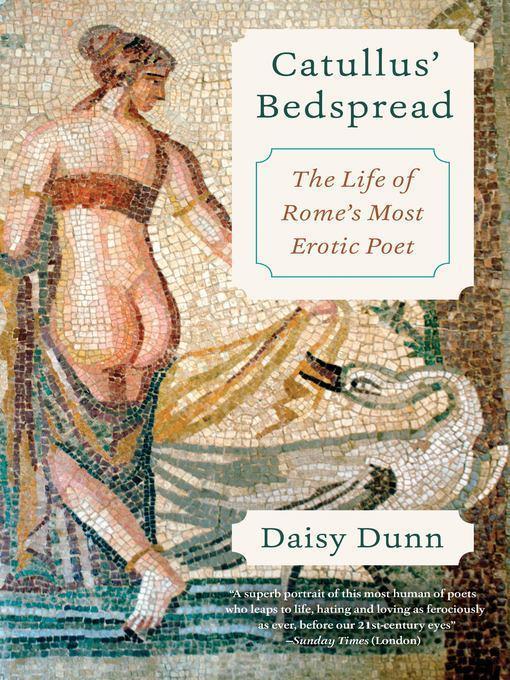
Catullus' Bedspread
The Life of Rome's Most Erotic Poet
کتاب های مرتبط
- اطلاعات
- نقد و بررسی
- دیدگاه کاربران
نقد و بررسی

May 9, 2016
With its quirky, mildly titillating title, Dunn’s work is sure to entice intrigued readers to her worthy subject, but anyone looking for salacious tales of Roman excess should look elsewhere. Instead, Dunn uses the poet Catullus (c. 82–53 BCE) as a lens through which to view late-republic Rome, with all its political intrigue, empire building, and, yes, sex. Extracting insights about his life from his poems, she places him expertly in his time and place, contextualizing what little is known about him today. Catullus is often overshadowed in the text by more famous and vivid figures such as Cicero, Julius Caesar, and Pompey. Also prominent is his married lover, Clodia, and his stormy relationship with her as evoked in his poems. Throughout, Dunn examines the corrupt, unsettled times that Catullus lived in and commented on while also giving insight into his literary choices and subject matter. A newcomer to Roman history may have difficulty following all the threads Dunn weaves together, but for those interested in the subject, Dunn’s exploration provides fascinating nuggets of knowledge, social history, and poetry. 8-page color insert. Agent: Georgina Capel, Georgina Capel Associates Ltd. (U.K.).

May 1, 2016
The short life of Rome's first lyric poet.Journalist and classicist Dunn (translator: The Poems of Catullus, 2016) reveals the "uncertain and turbulent times" of ancient Rome in this appreciative, informed biography of Catullus. Dying before he was 30, Catullus produced 117 poems "full of emotion, wit, and lurid insight into some of the key Roman personalities." Melding many literary genres, his poems' "apparent simplicity...often masks far greater, deeper sentiment and subtlety of thought," and he influenced later writers, including Ovid, Virgil, Horace, and Roman satirists. Central to Dunn's study is Catullus' longest poem, which she appends to this biography. She calls it his "Bedspread Poem" because it describes in detail the myths incorporated into the sumptuous wedding bedspread of one of Jason's Argonauts. "The bedspread," she writes, "was a visual web of words" that evoked history and mythology to create "a miniature epic." Dunn constructs her narrative around Catullus' verse, which she has translated from the Latin. "I see this very much as a joint venture: Catullus provides the poetry; I offer something of the world that informed it." That world was peopled by Cicero, the wealthy orator and statesman, who sought to bolster stability by strengthening Rome's Senate; ambitious Julius Caesar, a friend of Catullus' father, who "cemented his claim to Rome through dictatorship"; and the poet's beloved, Clodia Metelli, a married woman of at least 35 who appeared to him as a "shining goddess." He gave her the pseudonym Lesbia and made her the subject of a spate of erotic love poems. Lesbia became the poet's "raison d'etre." Among many revelations about Roman culture, Dunn speculates that because their affair produced no child, either Clodia or Catullus might have used some method of herbal or barrier contraception. A fresh, knowledgeable introduction to life, love, war, and rivalries in ancient Rome.
COPYRIGHT(2016) Kirkus Reviews, ALL RIGHTS RESERVED.

May 1, 2016
Classicist Dunn's (editor, Argo magazine) book delves deep into the ancient Roman cultural and political climate in which the poet Gaius Valerius Catullus crafted his erotic poems. The author's well-researched prose vividly meanders through Catullus's privileged, well-connected life. According to Dunn, Catullus's work influenced the development of the Latin love elegy, with his verse in the back pocket of greats such as Ovid and Tibullus. His poetry is described as being urbane--with his observations springing forth from profound experiences with the world around him, akin to "those of an elevated being." Although the writing tends toward the tangential at times, the author skillfully pieces together an uncensored portrait of her subject. The boy who eavesdropped on Julius Caesar grew into the artist who fell in love with Clodia and the man who mourned his brother's passing. The work includes a time line and an appended Poem 64 (bedspread poem). VERDICT Recommended for students of classical Roman literature and classical Roman history.--Nerissa Kuebrich, Chicago
Copyright 2016 Library Journal, LLC Used with permission.

June 1, 2016
Many would say the subtitle understates the case. Catullus (ca. 82ca. 53 BCE) was not just Rome's most erotic poet but also its best. Inspired by the classical-to-first-century-BCE Greek epigrams in Meleager's Anthologia, Catullus brought their emotionalism and pungency into his own poetry about, predominantly, lust, love, and friendship. He related those themes to myth, history, and the public affairs of his own day in epithalamia for friends' weddings, an epyllion or miniature epic that retells the legend of Theseus and Ariadne, and the sparkling, luscious, and sexually explicit lyrics so fervently embraced by literary modernism. Dunn carefully conjures his biography from his works and his relations with rich and powerful contemporaries, especially the clans vying to dominate the crumbling Roman republic, the Julians (led by Caesar) and the Pulchers, the family of Catullus' lover, Clodia Metelli. His life was that of a rich young provincial come to make a name in the capital and achieve the literary immortality he knew he could win and, despite the disappearance of his little book for centuries, did.(Reprinted with permission of Booklist, copyright 2016, American Library Association.)

























دیدگاه کاربران